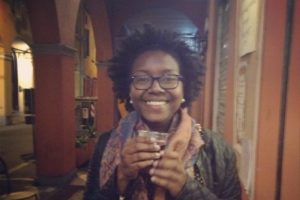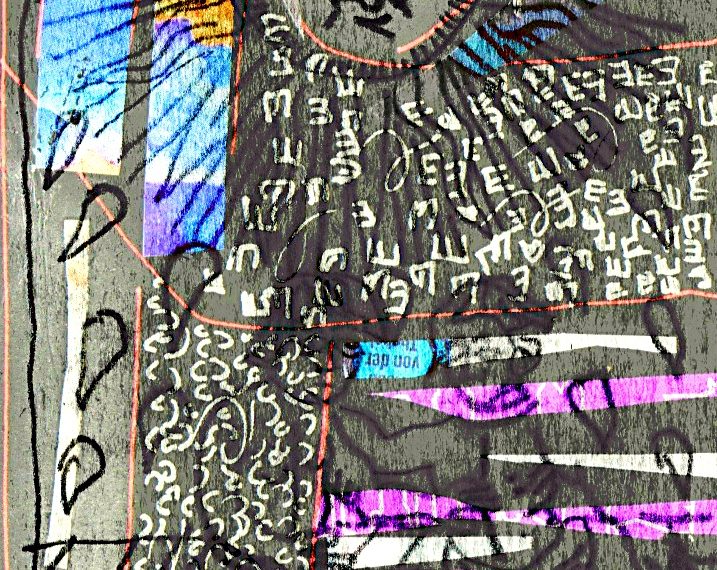It was an ordinary day at work in the beauty department of one of the classiest stores in the center of Milan.
“Good day ma’am, can you tell me who works here?” The middle-aged Milanese lady couldn’t imagine that I, the only person present at the make-up station, am the one she is looking for.
Another woman passes by looking for personnel, becomes curious and surprised by my work and expertise. “Excuse me, sister, do you work here? Wow, that’s great! How did you do it? Glad we found you, since you definitely know the right color for us.” The “sister” was happy and surprised to see a similarly hued woman at the make-up station. While she was looking for a powder foundation that matched her skin, she insisted that it was probably three tones lighter than the one used by her Sicilian friend.
“Look at how beautiful you are! Did you know that it’s raining outside because the sun hasn’t seen your smile? If I take you out for a coffee the sunshine will come back. Try it to believe it!” Then, the well-dressed aspiring Don Juan left to wander the city center hoping that his pick up lines would leave an impression on the heart of another saleswoman.
Then, to top it off, someone shouts “You don’t know who you’re messing with!” A trending reality television starlet feels offended for not being recognized and treated with the same respect as the rest of the customers.
“What am I doing here?” vehemently interrupted my thoughts. I couldn’t seem to think about anything else, for what, by now, appeared to be too long a time.
At the beginning, working in my hometown of Milan as a make-up artist seemed to be the most exciting job. I was stimulated working in the fashion capital, as I was regularly in direct contact with actresses, singers, lawyers, judges, politicians, and photographers at gala events. Each day offered something new, like an opportunity to meet new famous people or to organize a special event. I felt like I was living in the center of the world, and fortunate to have a fulfilling, exciting and well-paying job. Since I was eager to pursue a career as a make-up artist, I took a break from my university studies to get my diploma from a cosmetology academy. After I received my degree in political science, I was convinced that I would continue my career as a make-up artist since, as is well-known, it’s rare that with that degree you begin a career in politics.
Glamorous moments aside, I enjoyed the profession because I could connect with many different people. Women who were in show business for a long time passed by the beauty department to gift themselves some blush or a make-up session. They often told me stories about about life-changing events like divorces, betrayals or cancer, which always remained confidential.
For me, make-up was becoming more than a simple way to dress up the appearance of someone’s face; it had become my instrument to help women that often confided in me to feel more comfortable. It was as if they couldn’t live without enhancing their appearances so they could achieve their much needed self-confidence.
Soon enough I began to have conflicting thoughts. How do you support and sustain a woman who’s looking for happiness but cannot like herself? How do you convince a “sister” that lighter does not mean prettier? When a woman has her arms filled with make-up products, how do you make her understand that purchasing more items will not grant her a better relationship with her appearance? How can I be consistent with my intention when I have the goal of selling as many products as possible to meet my daily sales target?
I started having all of these thoughts at a time when you didn’t feel like an alien for not having internet on your cell phones. I’m talking about a period before Instagram. To be precise, two years had passed since three classmates in California launched YouTube. Now, you can watch an infinite number of beauty videos online that teach you how to do your makeup. I would’ve loved to direct my not so rich but eager women clients to learn more about how to do their make-up at home. However, I was able to witness some of my clients develop into some of the biggest Italian beauty influencers and youtubers. Sometimes I even thought that creating a space on social media to share my skills could be a solution that would allow me to remain in the beauty industry without depending on the priority to sell physical products.
I continued my university studies while pursuing my career in beauty despite my conflicting thoughts. I convinced myself that since I had a degree, I could find a job that was in line with my values instead of in contrast. Again, I was stimulated by the thought of a new drastic career change. After all those years of make-up sessions, I started getting swollen legs and back aches due to hours spent on my feet. I thought that a solution to my plight would be to apply my book knowledge to a specific field and land a 9 to 6 office job with weekends free. Individuals who work as freelancers or in stores dream of this type of lifestyle.
With my degree in hand, my new dream was to achieve white collar status. I didn’t have a specific position in mind. I could have worked in a communications office as an event coordinator or as a secretary. Who knows, but in the right environment and a bit of luck, I could rise in my career. Any desk job would’ve been fine to start.
With this clear objective in mind, I started the seemingly endless work of sending out my resume to recruiting agencies and through LinkedIn. This seemed like the most effective way to find a job. Unfortunately, as time passed, nothing seemed to progress except my frustration.
I asked myself how could it be that all of those years studying didn’t immediately bear fruit. I passed my days sneaking interviews at work, and unfortunately, no concrete offer came out of them despite recruiters stating that I was a good candidate. One day, I gathered my courage, counted my savings and quit my job. I needed to do it and really wanted to. Even though I was thankful for my experience as a make-up artist in the luxury and entertainment industries, I knew that life had more to offer me.
It was as if “the moment I had been waiting for” finally arrived. I made a list of goals to be achieved by 30. During one of those moments of hope and inspiration for a more prosperous future, reality hit hard and I needed to act fast. According to my list, I needed to have worked abroad for at least one year. At that point in my life I was 29.5 years old, so I couldn’t waste anymore time. While I prepared for my new adventure abroad I forced myself to sing along to Tracy Chapman’s: if not now then when, if not today then when.
One-way ticket from Milano-Eindhoven to Tilburg
I chose Holland for my Master degree studies. The Netherlands was the best choice for me according to my research about multiculturalism, economic prosperity, and international academic relevance. Out of the many languages I studied, I knew English well enough to live abroad.
London, England would have been the ideal destination. However, universities and the cost of living in London were too expensive for me. After countless financial calculations and cost- benefit analyses for numerous academic programs, I ended up moving to Tilburg, North-Brabant, a small university city in South Holland. Even companies like Tesla had chosen Tilburg as their headquarters.
Moving abroad for university studies and aspiring economic mobility made me a global citizen. Living abroad brought new opportunities and challenges. Compared to Milan, English is the lingua franca in Tilburg. I didn’t have any parents or friends to rely on in my new city. I was committed to molding myself into a self-made woman.
Sending myself back to school at 30 in another country and in another language after leaving a stable and well-paying job could may seem crazy, especially since my main objective wasn’t to begin a career in academia. Investing in my future seemed like the only option that justified leaving work and Milan.
I decided to enroll in a Global Communication Master Program, which focused on sociological diversity in areas like identity, language, and belonging. It was an environment that allowed me to continue my research on the significance of beauty, a topic that still interested me even though I was no longer at the make-up station. This time I was able to dig deeper from an academic perspective and focus my research on beauty amongst African descendants.
I could finally say I was an expat! I was living abroad and having an international experience. However, soon I learned that if you are black you say “refugee” instead of “expat”.
I moved to Holland with the expectation of living in a country that was more open, prosperous and less racist than Italy. At home in Milan, I could enjoy being exceptional: even though I was one of many women in the city, I was different due to my black skin. In multicultural Holland, people perceived me as a refugee, as a recently arrived black woman immigrant. I couldn’t leverage my Milanese accent, my vocabulary, or knowledge of the area that surrounded me to show what I was made of.
It’s important to recognize that Dutch prejudice is based on the fact that Tilburg’s population has grown and become more diverse thanks to young Eritreans such as myself. Compared to my situation, many of the new folks weren’t escaping cities like Milan but a dictatorship. To reach Holland, people passed through Italy, usually after crossing the Mediterranean sea on boats that you weren’t sure would arrive to land. People that looked similar to me didn’t necessarily dream of an office job but political asylum. We shared the same skin color but had completely different stories.
When I would ask for directions on the street, I made sure to use some Dutch words to encourage integration, often recommended by exceptional expatriates.
I would ask, “Mevrouw, mevrouw, spreekt u Engles? Ik zou graag de universiteit willen bereiken.” (Excuse me miss, do you speak English? I am looking for the university.)
The response, often accompanied with an appearingly compassionate smile, indicated that I was looking for the asylum seekers center. Then I responded to their bewilderment and shock, with something along the lines of this:
“La, la, la, me no refugee! Me expat! Me international student, me is gonna become a doctor from your universiteit!” (No, no, no).
The mevrouw responded to these words with a smile, probably feeling humored with a shameless joke from a shameless refugee.
But in all of this, if my appearance influenced how people viewed me, then I could turn the wrong side of the coin to my advantage. I decided to regularly spend time with the Eritrean community in Tilburg. Eventually, I started to gain popularity. I exchanged make-up demos for lessons about traditional guayla Eritrean music, stories about life in Europe for braids, and English lessons for a plate of zighini.
I finally found my expat community. Who knew that I would need to go all the way to Tilburg to rediscover my Eritrean roots?
Once my Master program ended, I was thinking about a career where I would feel most comfortable as myself and could nurture my roots. I decided to depart again, but this time in a place that allowed me to be close to friends and family.
This meant back to Milan. Now here I am, reflecting about the inner workings of an AfroItalian expatriate in Holland who then decided to move back to Milan, and on the importance of putting everything into perspective.
Now I work a part-time office job in a role that stimulates me, but pays me more or less the same amount when I worked as a waitress when I was 20.
My Dutch experience taught me three things. Firstly, when times get tough, the motto “the marathon continues” is a good one to have. Secondly, “my house is where I am” is a phrase to always keep in mind, either as an expatriate or a refugee, or even during a homecoming. Lastly, if life gives you lemons, you make lemonade.
Translation by Candice Whitney.

Addes Tesfamariam (Milan,1985) after her studies in Political Sciences at the Università of Milan moved to Holland where she studied sociolinguistics and conducted research on identity and Afro descendants. She currently lives in Milan where she continues to pursue her work on Afro descendants and identity representation.

Candice Whitney is a researcher, writer and international education professional based in New York City. In 2016-17 as a Fulbright Scholar, she conducted research on how the historical and political processes that shape Italy’s contemporary relationship with African countries impact the promotion of products and business relations amongst African women entrepreneurs in Italy. Candice received her Bachelors of Art in Anthropology and Italian from Mount Holyoke College. More about Candice’s work can be found on her blog.
Cover image: Artwork by Irene De Matteis.




















































